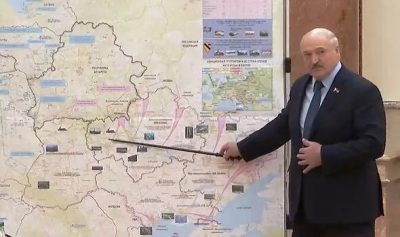US-NATO Wants to Drag Belarus Into War with Ukraine?

All Global Research articles can be read in 51 languages by activating the Translate Website button below the author’s name.
To receive Global Research’s Daily Newsletter (selected articles), click here.
Follow us on Instagram and Twitter and subscribe to our Telegram Channel. Feel free to repost and share widely Global Research articles.
***
The joint exercises between the Belarusian and Russian Air Forces, which are currently being held in Belarus, are of a defensive nature and are a response to the collective threat the two countries face from NATO and neighbouring Ukraine. These exercises are being held at a time when the West is pushing Kiev to open a new front against Belarus, which is of particular importance because Poland is massing troops on its eastern border.
Western countries have significantly increased their provocations by conducting military exercises, concentrating its troops, and amassing heavy weapons near the Russian-Belarusian borders. Just as Russia was drawn into conflict with Ukraine because of the country’s unrelenting willingness to carryout Washington’s demands, even if its contrary to its own interests, the West hopes that Belarus can be drawn into the war in a much deeper way.
The joint air force exercises began on January 16 and will last until February 1. The main goal of the exercises is to increase operational compatibility in joint combat tasks, something of critical importance given the war waging in neighbouring Ukraine, and in which Kiev is being financed by the tens of billions of dollars. None-the-less, it must be noted that the deeper integration of the Russian and Belarusian militaries began long before Moscow launched its special military operation in Ukraine.
These military exercises also raise speculation on whether Belarus will enter the Ukrainian conflict. Belarus does not want to be drawn into the conflict if it can be avoided, but President Alexander Lukashenko will certainly not shy away either if it is necessary.
Kiev finds itself in a conundrum. On the one hand, Kiev hopes that a Belarusian military operation would force a direct Western intervention in the war. However, if Ukraine is to provoke Belarus, it also runs the risk of the Belarusian military pouring into Kiev, Zhitomir and Chernigov oblasts, thus forcing Ukrainian troops and resources from other fronts, and with no guarantee of a western intervention. The West is content with seeing Ukraine destroy itself in the attempt of weakening Russia, and hopes that Belarus can also be drawn into this mess.
It is recalled that Ukrainian Deputy Interior Minister Yevhen Yenin already told the BBC in December that Ukraine would be bolstering its border with Belarus by allocating further armed forces and ammunition, something which could be used more effectively on its battlefronts with Russia.
If Ukraine is to provoke Belarus into conflict in the hope that it will lead to Western intervention, and the West does not directly intervene, it would be a major disaster. It is this risk-reward factor that Kiev is still debating. Kiev already frequently complains about the West’s lacklustre support and it is highly unlikely that the West will begin directly intervening in Ukraine because Belarus also entered the conflict and in this case the main repercussion for Minsk will be more sanction packages.
At the same time, considering the deterioration of the situation on the western borders of Russia and Belarus in October last year, Lukashenko approved the deployment of a joint regional military group. With the aim of strengthening border defences, the total contingent of the Russian military in the joint group is about 9,000 soldiers. According to earlier announcements, the group will include about 170 tanks, about 200 armoured fighting vehicles, and 100 artillery pieces and mortars.
Lukashenko previously warned that the West is pushing Ukraine to open a front against Belarus. It cannot be discounted that NATO and some European countries are considering options for aggression against Belarus.
Apart from bordering Russia, Belarus (with an etymology meaning “White Rus”) is sandwiched between the Russophobic countries – Ukraine, Poland, Lithuania, and Latvia. Poland is amassing an army on the eastern border with Belarus, while NATO troops are stationed in the Baltic countries. The latest tanks and planes have arrived in the Baltics, suggesting that there are enough weapons to open another front against Belarus.
It is for this reason that joint air force exercises between Belarus and Russia is critical, especially as the Russian Air Force has a high-level of combat readiness and recent experience (when considering the war in Ukraine, Syria since 2015 and Georgia in 2008), something that the pilots of Ukraine, Poland and the Baltics do not have. For this reason, transferring this combat experience to the Belarusians through joint exercises will also improve the defence and security of Russia.
For now, it is unclear whether Kiev will push ahead in forcing Belarus into conflict. It is highly likely that Washington wants Belarus to be dragged into the war but at the same time it seems to be reluctant to directly intervene if Lukashenko gives the order to attack Ukraine.
Ukrainian President Volodymyr Zelensky has been a useful puppet for the US thus far, however, even he must surely know that forcing Belarus to intervene in the war will only create more problems for the struggling Ukrainian military. At the same time, the Kiev regime since 2014 has been in the habit of serving foreign interests rather than their own, and for this reason, as Ukraine is unpredictable, Belarus must also have high combat readiness in case the Ukrainians do instigate provocations.
*
Note to readers: Please click the share buttons above. Follow us on Instagram and Twitter and subscribe to our Telegram Channel. Feel free to repost and share widely Global Research articles.
Ahmed Adel is a Cairo-based geopolitics and political economy researcher.
Featured image is from InfoBrics

